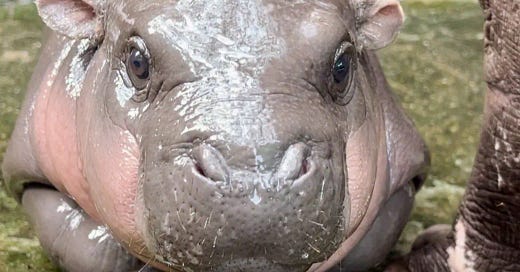Who is Moo Deng? And what is behind the explosive human interest?
The internet's most famous animal right now is many things at once: cute and cantankerous; celebrity and zoo exhibit; conforming and not conforming. But she's also an endangered species...
Here is a recipe for making an internet animal sensation. 1. First, take an animal with a cute expression. 2. Add a vivacious personality and lots of videos. 3. Allow to simmer across social media for, give or take, a couple of months.
That’s the story of Moo Deng, a pygmy hippo born two months ago at Thailand’s Khao Kheow Open Zoo, who is fast becoming a viral megastar. Moo Deng’s hapless, adorable growing pains have been streamed to millions via social media, where videos show her bathing, play-biting and generally causing mischief. Last weekend, she even appeared (albeit played by a man in costume) on Saturday Night Live.
From the sidelines, it’s interesting watching internet animals like these, many of whom accrue millions of followers and plenty of royalties along the way. Past internet animal celebrities include Grumpy Cat, for instance. And Tuna Dog, a Chihuahua–Dachshund crossbreed dog with a charismatic, if tragic, overbite.
But Moo Deng is different. She’s not a pet, for starters. She’s a captive representative of a mammal lineage right on the edge of survival. Just 2,500 or so pygmy hippos survive today in the jungles and swamps of West Africa. She's an endangered species who, right now, conservationists are working hard, with local stakeholders and community forest guards, to protect from threats including habitat loss and poaching. Not that you’d hear this side of the story on many of the Moo Deng social media posts, cakes or merchandise, which is a shame…
Why are we so in love with Moo Deng? What’s her secret?
Moo Deng’s cuteness is surely part of the reason for her success. It’s long been hypothesised among evolutionary biologists that some facial features of human infants (think big head, big eyes, protruding cheeks) may have evolved to evoke psychological and neurological responses that encourage caregiving in human adults. According to this argument, the internet adoration Moo Deng receives is partly because she happens to have tripped our hard-wired predisposition for bulbous heads and large eyes. But is there any evidence to support that claim?
The ‘I’m-cute-care-for-me’ hypothesis, termed the ‘Kindchenschema’ (‘child’s scheme’) by the ethologist Konrad Lorenz, has some evidence to support it. Choice experiments, involving adults selecting between photos of human infants that each vary in their facial features, suggest a bias towards ‘cute’ faces does exist. Other evidence comes, more indirectly, from pet breeding. Pugs, bulldogs, Persian cats and other big-eyed flat-faced breeds did not manifest themselves automatically, after all.
But cuteness isn’t everything, because many internet animal celebrities are not cute, they’re ugly – many have over-bites (as mentioned), bad teeth or grumpy tempers. But Moo Deng ticks this box too. For every video of her doing something cute, like sleeping with her legs in the air, there’s a video of her raging against her handlers, play-biting, running away, seemingly screaming in despair.
And so, the strange magic of Moo Deng, different to other animal internet stars, is that she is two things at once. Cute and cantankerous. Conforming and not conforming. A celebrity and a zoo exhibit. An internet meme but also a juvenile mammal going through the motions of development, a member of a species on the brink of extinction.
In the next few weeks and months, whether she likes it or not, Moo Deng will continue to cement her place in internet history. But we mustn’t forget that every social media ‘share’ offers us a chance to shine a spotlight on the endangered species that she is part of. Then, when her star finally starts to fade (as it does for all celebrities), her existence won’t have been for nothing – it might really have meant something for the future of animals on our planet.
Moo Deng’s story is still being written. We can all play a part in shaping its ending.
This is an edited version of my column for BBC Inside Science, which aired on Radio 4 last Thursday. You can catch up here. P.S. I should say, since appearing on the show, I am being targeted on social media by ‘crypto-currencies’ using Moo Deng as their ‘friendly-face’ - that says a lot, right?
Anyway, thanks for reading. Hope you have a good week and all best.
Oh, two quick things:
Thanks to American readers for your delightful comments and mail about Infinite Life - I am so pleased! (Someone even told me they’d also seen the vintage footage of the kangaroo birth many years ago and used it in class when they went on, later in life, to become a teacher!). The book is now available on Audible in the US (as well as the UK) narrated (in full East Midlands glory) by me.
Talking of Infinite Life, I’m doing New Scientist Live next Saturday (2.30pm, 12th October) and, on the Sunday (13th) I’ll be at Sheffield’s Off-The-Shelf festival, performing at 1pm at Firth Hall. Please come and say hello!
![[Nature's Footnote]](https://substackcdn.com/image/fetch/$s_!C6DB!,w_80,h_80,c_fill,f_auto,q_auto:good,fl_progressive:steep,g_auto/https%3A%2F%2Fsubstack-post-media.s3.amazonaws.com%2Fpublic%2Fimages%2F41ee839f-f351-42db-89ad-75e937e76525_1280x1280.png)

![[Nature's Footnote]](https://substackcdn.com/image/fetch/$s_!C6DB!,w_36,h_36,c_fill,f_auto,q_auto:good,fl_progressive:steep,g_auto/https%3A%2F%2Fsubstack-post-media.s3.amazonaws.com%2Fpublic%2Fimages%2F41ee839f-f351-42db-89ad-75e937e76525_1280x1280.png)


